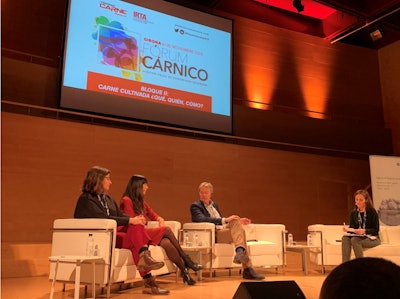
According to an Ispos report from November 2018, 15% of the population in Spain follows a flexitarian diet. The report also states that vegans and vegetarians, are minorities, but those dietary trends are increasingly having more followers.
There are several reasons to follow these diets, but basically they are two that summarize it: environmental sustainability and animal ethics.
But one of the interesting aspects of the aforementioned report is that in Spain, 25% of the population is interested in the development of synthetic meat options.
Meat alternatives
The Institute of Agrifood Research and Technology (IRTA) of Catalonia and TecnoCarne magazine held the Meat Forum in Girona on November 6, with the objective of analyzing the alternatives to traditional meat. These alternatives are vegetable meat, meat analogues and cultured meat. It is worth mentioning that although Girona is the smallest province in Catalonia, it concentrates a good part of the Catalan meat industry, so this debate becomes more relevant.
Pioneer companies
The food sector is no stranger to this evolution. Proof of this is that there are multinational companies that have already pledged to make meat alternatives available, such as Nestlé or Burger King. In Latin America, Seara (JBS) from Brazil already has its Incredible Hamburger.
During the Meat Forum – a perfect mix between research and practical applications – there were several Spanish companies (such as Tomorrow-Heura, Noel or Zyrcular Foods) involved, in one way or another, in manufacturing finished products without meat, meat analogues or other options. The Dutch company MosaMeat was also there, a pioneer in the field of cultured meat.
There were also companies such as CSO Cubiq Foods that presented cultured fats, or sustainable alternatives such as those of CEO Biotech Foods.
The challenges of meat alternatives
Meat alternatives pose several challenges to the food industry. For example, one of the key points is to see whether it is sustainable to produce them. Many groups have declared war on all-meat production, including poultry, for the “unfavorable conditions” of producing it. But we must not forget that, for example, in the case of cultured meat, a feed is needed for the cells to grow in the culture.
There is also the analysis of what compels human beings to consume meat and to reproduce those sensations in the new products. In addition, meat goes through an aging process, in which several enzymatic reactions provide the determining characteristics, not only of quality, but also of taste.
Many also wonder what will happen to customs and traditions, such as barbecues. Surely there will also be consumers asking for pieces of meat for roasting or that can be frayed.
Opportunities in sight
The meat industry – including the poultry industry – needs to get on board. These new alternatives should not be feared, since meat production will continue to increase. It should not be forgotten that the milk industry also entered into the production of other “milks,” such as from soy or oats.
One of the options that seems promising, and in which the meat industry fits well, is the production of “hybrid meat,” a mixture of artificial meat and real meat.
The door is open to innovate.
















